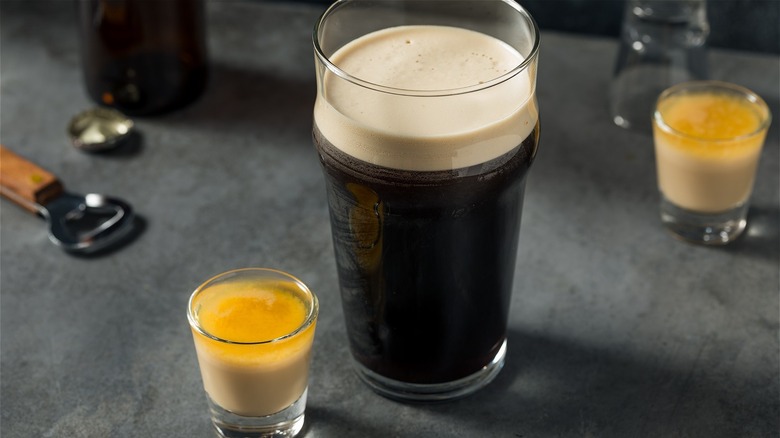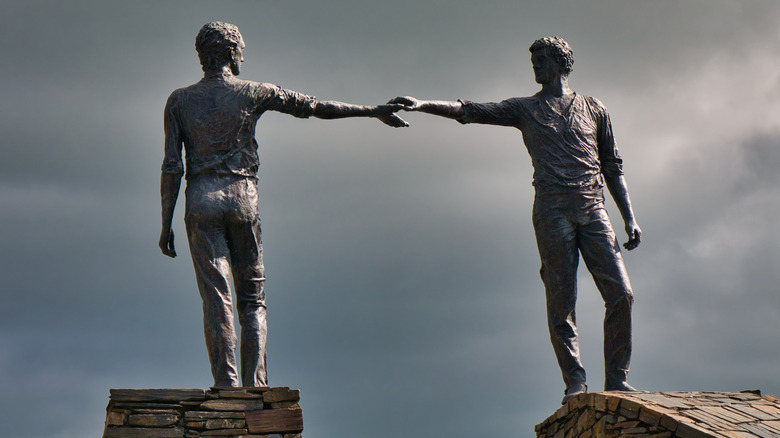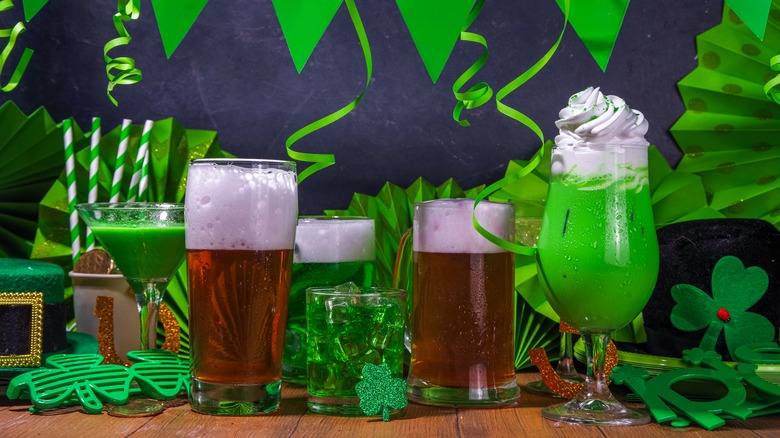Why You Should Think Twice Before Ordering An Irish Car Bomb Again
The Irish Car Bomb is a popular alcoholic beverage that consists of Irish whiskey, Irish cream, and a pint of Guinness. A typical serving contains approximately 1.5 ounces of whiskey, 1 ounce of Irish cream liqueur, and a full pint of beer. It is made by dropping Bailey's Irish Creme and Irish whiskey into a full pint of Guinness stout. While this drink may be a favorite among some, it is important to recognize that the name of the drink is culturally insensitive and offensive. Attempting to order this drink at Irish or English pubs will get you some dirty looks at best, and thrown out or refused service at worst.
This cocktail is not a fun and festive way to celebrate St. Patrick's Day or any other occasion, and there are several reasons why it is a problematic and potentially harmful beverage. If the holiday in the U.S. is meant to be a celebration of Irish-American culture, this drink does the opposite by glibly referencing one of the saddest and most violent periods of Irish history.
The Irish Car Bomb is not just a drink, it's terrorism
The drink name, Irish Car Bomb, itself is insensitive, especially to those of Irish heritage. The term refers to acts of terrorism that occurred in Northern Ireland during the Troubles, a period of conflict and political violence from the late 1960s to the late 1990s. During the Troubles, or Na Trioblóidí in Irish, paramilitary groups and the British armed forces engaged in violence that left people on both sides, and innocent civilians, injured or killed.
One of the most notorious groups, the Irish Republican Army (IRA), wielded a weapon that instigated fear throughout the world: the car bomb. Quickly made with supplies found around the home or garage, any car in Ireland or Britain could be turned into an explosive device the instant its engine started. Groups on both sides of the conflict quickly started implementing car bomb campaigns of their own. Soon, it didn't matter what anyone's personal political beliefs on the issue were: everyone was at risk.
The Troubles and its impact on Irish culture and society have been documented in many forms of media, most recently in the Netflix series "Derry Girls." Today, people who lost loved ones or were permanently maimed or traumatized by the terrorism of the Troubles still live in Ireland, Northern Ireland, and Britain. The use of "Irish Car Bomb" in a celebratory context trivializes the suffering and trauma that many people experienced during this time.
St. Paddy's Day drinks that are better than the Irish Car Bomb
If our history lesson can't sway you from trying an Irish Car Bomb this St. Patrick's Day, you should also know: it's just a gross drink! There are far better drink choices for the holiday that won't get you thrown out of the pub or a stern telling off from a grandda in a cableknit sweater.
All beers, ciders, and liquors made in Ireland are, of course, on the menu. Guinness stout beer, Magner's cider, and Jameson whiskey are some of the most popular brands. Harp Lager is the pale alternative to the dark Guinness, and mixing the two creates a "half and half." Just don't call it a "black and tan," which in Ireland, refers to the British soldiers who attempted to put down the Irish War for Independence.
Though not the most traditional choice, green cocktails are popular on St. Patrick's Day. The grasshopper, a dessert drink made with bright green creme de menthe, is typically found in bars on St. Patrick's. Other green-hued drinks, like green tea shots or apple martinis, are usually on pub menus, alongside whiskey cocktails like Irish coffee, the old-fashioned, and whiskey sours. But for the love of St. Patrick, do yourself a favor and skip the green beer.


